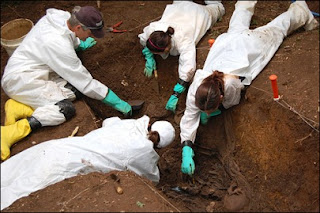 Serial killers have become major players on the public stage and in the media since the 1970s. The great prevalence of serial killers in the popular culture indicates that I am not alone in my fascination with them. Serial killers are transformed into larger-than-life popular culture celebrities through the combined efforts of law enforcement authorities, the news and entertainment media, and the public’s appetite for the macabre.
Serial killers have become major players on the public stage and in the media since the 1970s. The great prevalence of serial killers in the popular culture indicates that I am not alone in my fascination with them. Serial killers are transformed into larger-than-life popular culture celebrities through the combined efforts of law enforcement authorities, the news and entertainment media, and the public’s appetite for the macabre.
Exaggerated depictions of serial killers in the mass media have blurred fact and fiction. As a result, real-life killers such as Jeffrey Dahmer and fictional ones like Hannibal “The Cannibal” Lecter have become interchangeable in the minds of many people.
When you bring up the name of an infamous real life predator such as Jack the Ripper or Ted Bundy in conversation with a group of people, it is clear that serial killers are a hot topic. Some folks actually become gleeful in their demeanor when discussing them. Why is that?
Could it be that some of us have a macabre fascination with serial killers for the same reason(s) that many of us are morbidly drawn to stare at a catastrophic automobile accident unexpectedly encountered along a highway?
Therein lies the central question of book. Why are so many people, including myself, fascinated by serial killers? Answering this intriguing sociological question and shedding light on serial killer myths, while providing compelling new insights into serial homicide are the primary objectives of my new book Why We Love Serial Killers: The Curious Appeal of the World’s Most Savage Murderers. See http://www.docbonn.com/why-we-love-serial-killers.html
Highly stylized and pervasive news media coverage of real-life serial killers and their horrible deeds transforms them into what I refer to as celebrity monsters. In order to understand why so many people in society are captivated by serial killers, it is necessary to examine the social agents and processes that promote them.
Unlike other books about serial killers which only focus on the behavior of the criminals, this book offers an exploration into the dark nature of society itself and its powerful appetite for the gruesome, while also providing new and unique insights into serial murder. The groundbreaking approach in this book provides a penetrating sociological look at the public’s fascination with serial homicide.
This book is unique in its examination of serial killers as popular culture personalities. Unlike most other books on this subject, the primary focus of Why We Love Serial Killers is not on the crimes of serial killers. Much has already been written about that. Although this book offers many new insights into serial homicide and provides shocking facts and anecdotes for true crime enthusiasts, the really unique contributions of this work lie in explaining why serial killers fascinate so many people, and how and why serial killers are transformed into morbid popular culture personalities or “celebrity monsters.”
In many ways, serial killers are for adults what monster movies are for children—that is, scary fun! However, the pleasure an adult receives from watching serial killers can be difficult to admit, and may even trigger feelings of guilt. In fact, the research conducted for this book reveals that many people who are fascinated with serial killers refer to it as a guilty pleasure.
The average person who has been socialized to respect life, and who also possesses the normal range of emotions such as love, shame, pity and remorse cannot comprehend the workings of a pathological mind that would compel one to abduct, torture, rape, kill, engage in necrophilia, and occasionally even eat another human being. The incomprehensibility of such actions drives society to understand why serial killers do incredibly horrible things to other people who often are complete strangers.
As such, serial killers appeal to the most basic and powerful instinct in all of us—that is, survival. The total disregard for life and the suffering of others exhibited by serial killers shocks our sense of humanity and makes us question our safety and security.
The research I conducted for this book reveals that the public loves serial killers for a number of interrelated reasons. First, they are rare in the business of murder with perhaps twenty-five or so operating at any given time in the U.S. They and their crimes are exotic and tantalizing to people much like traffic accidents and natural disasters. Serial killers are so extreme in their brutality and so seemingly unnatural in their behavior that people are drawn to them out of intense curiosity.
Second, they generally kill randomly, choosing victims based on personal attraction or random opportunities presented to them. This factor makes anyone a potential victim, even if the odds of ever encountering one are about the same as being attacked by a great white shark. Third, serial killers are prolific and insatiable, meaning that they kill many people over a period of years rather than killing one person in a single impulsiveact, which is the typical pattern of murder in the U.S.
Fourth, their behavior is seemingly inexplicable and without a coherent motive such as jealousy or rage. They are driven by inner demons that even they may not comprehend. Many people are morbidly drawn to the violence of serial killers because they cannot understand it and feel compelled to.
Fifth, they have a visceral appeal for the public similar to monster movies because they provide a euphoric adrenaline rush. Consequently, their atrocity tales in the news and entertainment media are addictive. Finally, they provide a conduit for the public’s most primal feelings such as fear, lust and anger.
No comments:
Post a Comment